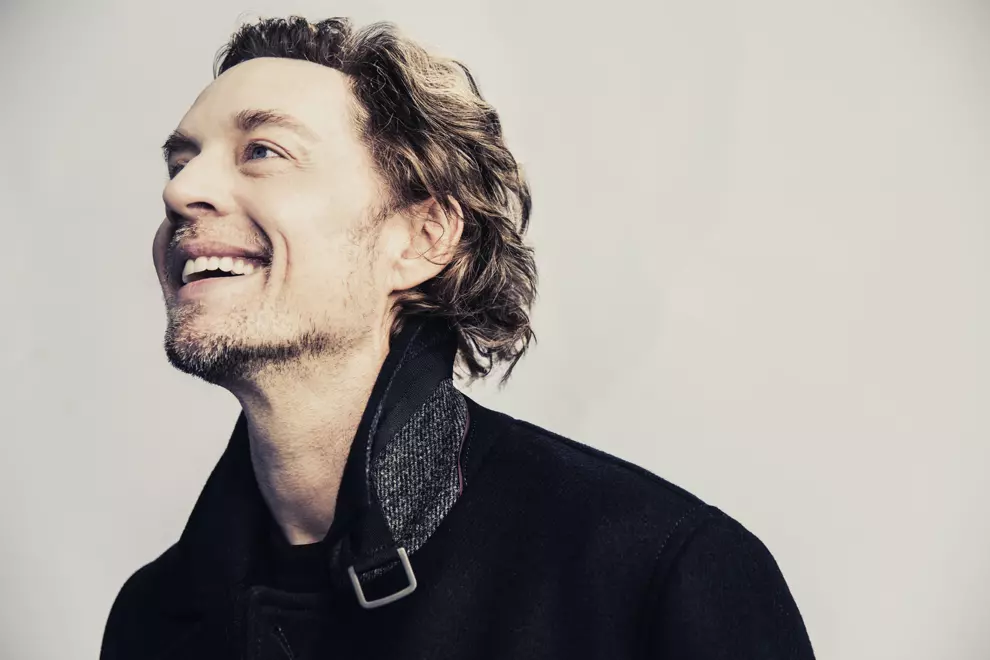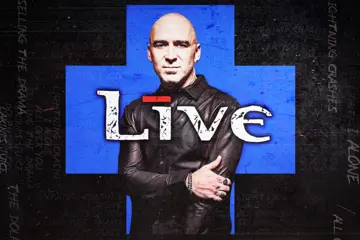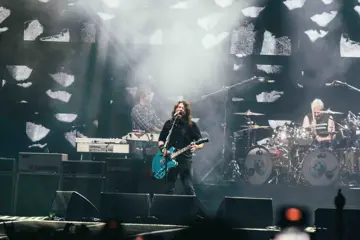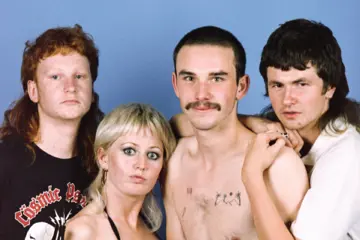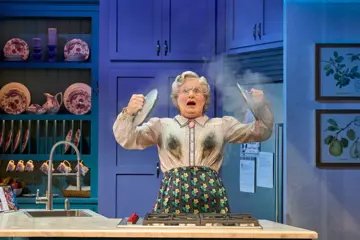 Darren Hayes
Darren HayesDarren Hayes is an Australian music icon. As the singer and songwriter for the short-lived duo Savage Garden, he penned some of the greatest pop songs of all time, from To The Moon And Back to I Want You to Truly, Madly, Deeply, to Affirmation to The Animal Song with his bandmate, Daniel Jones.
Since the band’s disbandment in 2001, Hayes has released five solo albums. His latest record, Homosexual, comes after a decade-long hiatus that he needed to reset himself and fall in love with making music again.
Situated in his very professional, cool home studio, Hayes contemplates all things music, general depressive disorder, and being in a place where he can call himself a proud gay man.
“My record is a lot about getting rid of shame, so I’m glad you picked up on that,” Hayes says, recalling the external factors – social and societal – that instil queer people with a sense of shame. “It was so beautiful and liberating and loving and embracing and so different from the first time I performed there,” he remembers about his Mardi Gras 2022 performance.
Don't miss a beat with our FREE daily newsletter
“The first time I performed there, I'm not quite sure of the date; I think it was 2005,” he begins. “Even though I was out to everyone that knew me and I was married to Richard [Cullen] (the pair privately married in 2005 and held a marriage ceremony in California in 2013 as a gesture of support for same-sex marriage rights), I hadn't announced that to the world yet. I was deeply covered in shame. And I remember looking out at the audience and feeling like something was deeply wrong because I saw how much everybody was having a good time and how much the audience had self-love. Yeah, and I just didn't; I was so deeply uncomfortable in my skin. So, the contrast to [last year], I think you can see in the footage, I was beaming.”
And then, another beautiful moment: “I said something about, ‘I believe God does not endorse religious discrimination bills,’ [before performing Affirmation] and then it just came to me. I just said, ‘Thank you for loving me, even when I didn't love myself.’ But what I didn't anticipate was saying that almost made me cry, which is not good for singing [laughs].
“I had a lump in my throat, and then I had to go and sing Affirmation, which is really hard for me. It's a very fast song, and it's quite high up in my register. I'm running underneath that flag, and I'm just going, ‘Don't cry. Don't cry, don't cry, don't cry.’ But that'll give you a taste of just how beautiful it was. I loved it. And I'm so grateful.”
Darren Hayes found confidence in creating Homosexual – he sang, played the instruments on, and produced every song on the album. “Part of why I left music, truthfully, was because I think I was a little bit bored. I was repeating the same cycles over and over again,” he shares, noting that having a level of stakes for the album was essential.
“I think having limitation in art; whether that's like a time crunch or a deadline – when you have a deadline, suddenly you get that article finished,” Hayes continues. “And for me, it was that if I couldn't play it, then I couldn't put it on the record. So, there are certain things like, I don't play the guitar, but there are guitar solos on this record; how did I do it? I sang and put my voice through a guitar amp and distorted it. These wonderful limitations made me think and be creative within constraints and feel like I was 19 again and trying to just work out how to track my voice or how to make demos.”
Elsewhere on the album, Hayes is flirty and sensual; themes that he deemed absolutely necessary. “Men are allowed to have this no expiration date on how old they can be and still be considered sexy, but that doesn't seem to extend to gay men in the gay community. Youth is still king, right?,” he says before harkening back to the time he saw the 2017 romantic drama film, Call Me By Your Name, directed by Luca Guadagnino and starring the actors Timothee Chalamet and Armie Hammer.
“I was just filled with grief [watching the film]. Not only did I feel like, I wish that I had had a positive experience when I was a young person, both from my father or my own self-love, I wish that I was able just to have no ounce of internalised homophobia,” he reveals. “I think I'd started to see myself the way the media saw me, which was that it's almost like I was this, you know, lovely, harmless uncle Darren. I think we do that to gay people sometimes. We desexualise them because we can't bear the thought of what they look like between the sheets, and I was raging against that.
He adds, “In my mind, I was like, ‘No, I'm not ready to go into the dying light’. And you see that in the music video [for Let’s Try Being In Love]. I decided to cast myself in a romantic lead. I'm going to make music that’s sexual, and if it's uncomfortable for you, then that's something that you have to grapple with. That's about you. That's a you problem.”
Hayes has always created art through a cinematic lens. “Music is enmeshed with visuals for me. Maybe that’s because I’m a child of the MTV era, or because movies, especially Steven Spielberg and George Lucas-directed films, provided such an escape for me from the sorrows of my childhood,” he writes in an email, addressing some topics we didn’t have enough time to get around to. “When I write music, I see visuals and create worlds.
“For this album, for example, I created the visual world first. I bought clothing from vintage sellers online from the mid-1980s, I was obsessed with the colour peach, and I had folders of clip art and imagery online that evoked a period in time that looked exactly like the music sounded if that makes sense.”
In a 2017 Billboard interview, Hayes said that his radio play was impacted once he openly came out as gay. The press cycle for Homosexual has been amazing so far, with glowing reviews and poignant interviews in Rolling Stone Australia and The Guardian. How has the radio play been, though? “To be perfectly honest, I think back then I was referring to the fact that, as a gay artist, I was considered a ’niche’ artist, and that was frustrating at times because it was as though my sexuality was seen first and the song second.
“But I never felt that was homophobia,” he continues. “I think that was more about not being on a major label and being seen as gay first and therefore put into a smaller category - for example - on queer playlists or LGBTQ-themed shows at the expense of being seen as a mainstream artist.
“I wish I could tell you things were different now - but the truth is I’ve had virtually no radio support. I released four songs from my album before it dropped, but none were played on the radio. Only one song, All You Pretty Things, was actively promoted to radio - but aside from a few regional stations, all the major networks declined to add it. But before you feel sorry for me - I don’t feel sorry for me. When I made this album, I knew it wasn’t tailored for radio. I deliberately ignored commercial considerations, and I think that’s why it’s so good.”
On Poison Blood, Hayes explores intergenerational trauma, including general major depressive disorder, which he inherited. How does Hayes find the will to go on during the darkest days? “That's a beautiful question. Thank you for asking that,” he starts. “I think we always have to remember that each one of us is essential and that we change and improve everybody's lives. Everybody is affected positively by our place on this earth.
“Every time that I've had a thought about wishing that I wasn't here, when the mood passes, the next day, something trivial will happen, and I think, ‘I'm so glad I was here to witness that.’” And that trivial moment can be as simple as having the best mac and cheese ever, or as brilliant as Madonna releasing a new song.
On Music Video, Hayes revisits his younger self. Notably, 1982 and 1984 Darren Hayes. He notes that going back in time was painful, which is why he wanted to ensure the song sounded joyful. As a child, Hayes would disassociate to escape the bullying he faced.
“When people were teasing me or calling me gay or when the school principal called me a fairy or whatever, I would think, one day I'm going to be a pop star. And it's how I survived,” he shares. “I think our imaginations are extraordinary, and I think children have an incredible ability to adapt. The sad part about trauma is that we create behaviours that help us through the moment, and then as adults, we think they're no longer necessary. In songs like Nocturnal Animal, I'm still talking about those fight, flight, and freeze mechanisms that are still deep in my Windows 95 brain.”
Hayes’ husband, Richard Cullen, a British animator, designer, director, and screenwriter, has been by his side every step of the way. “He's my unofficial A&R guy. He'll open his door, and he'll yell out, 'What's that song?' That's how I know he likes something,” he laughs. But the couple have also cried together.
“We experienced the highs and the lows of my career together. He saw how lost I was before I made the record,” he adds. “Richard saw how happy being creative again made me, and he's really seen the joy that I've had basking in the validation of it doesn't matter how many copies it sells or if it makes money, it's already impacting people, even in the comments that you made. They mean so much to me, and I've had so many queer people validate the art. And that's the only reason to do this.”
'Homosexual' is out now; listen here. Darren Hayes will be touring Australia on his 'Do You Remember? Tour' from 31 January through February. Find tickets on his website.

